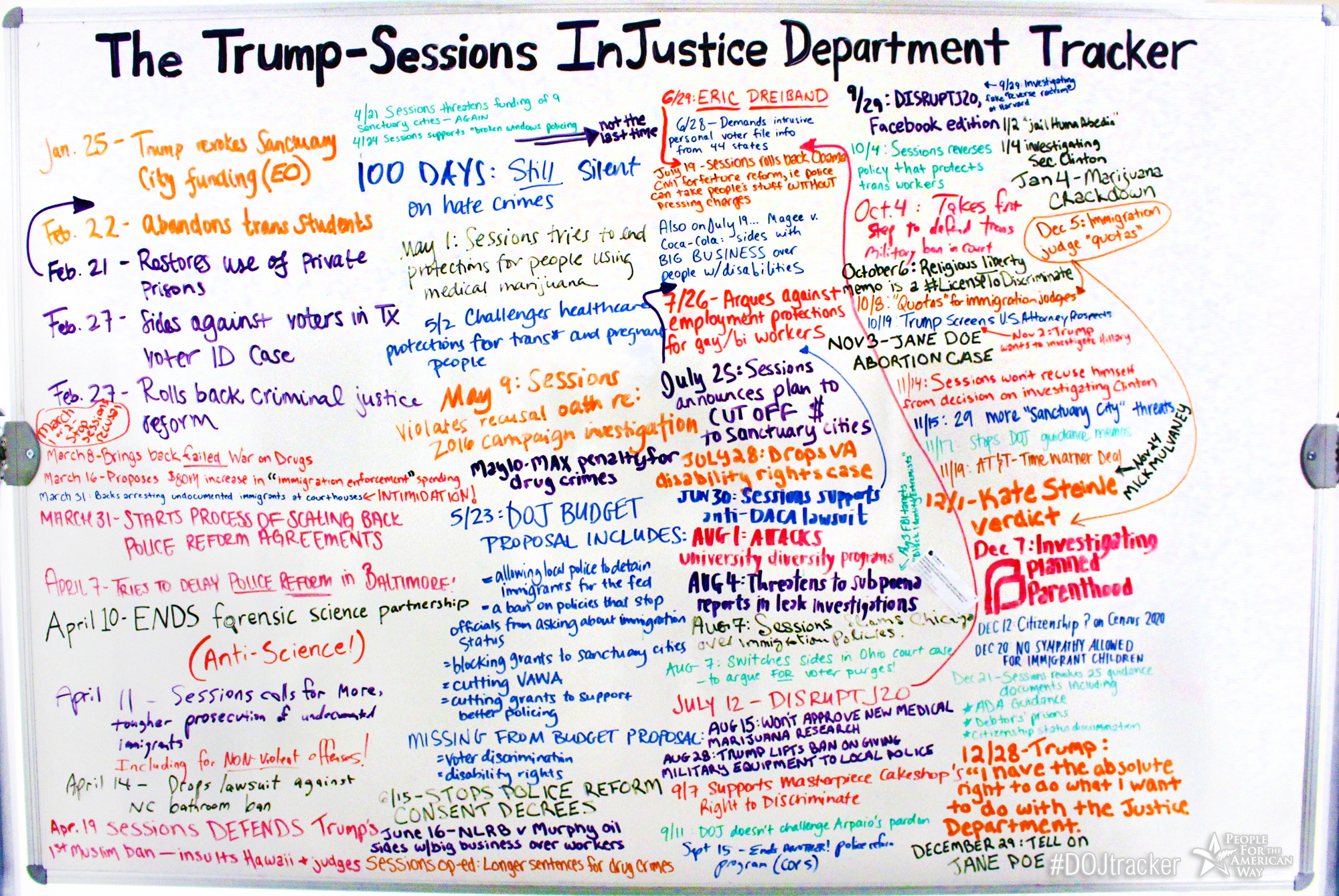
Since its founding, the Department of Justice has been responsible for ensuring fair and impartial administration of justice for all Americans. Its history points to a legal and moral duty to safeguard civil rights, especially for people of color, LGBTQ people, and other marginalized Americans. Today, under the leadership of Attorney General Jeff Sessions, the Justice Department is walking back this critical work. PFAW has been fighting back since the day Attorney General Jeff Sessions was sworn in to lead the Justice Department.
On this white board we will track every step that Donald Trump and Jeff Sessions take to dismantle DOJ’s legacy, paying particular attention to six areas where DOJ’s influence is hugely significant: voting rights, hate crimes, federal criminal law and mass incarceration, police reform, immigration, and civil rights enforcement. We need a DOJ that will uphold the progress that the department has made over several decades and continue pushing justice for all.
If you see something that you think we’re missing, please let us know on Twitter or by email. Last updated December 8, 2017.
January 4: Marijuana crackdown
Jeff Sessions rescinded an Obama directive that discouraged enforcement of federal marijuana laws in states where it has been legalized. The actions taken by Sessions, who once said “good people don’t smoke marijuana,” means prosecutors who were reluctant to bring cases involving medical and recreational marijuana may be more willing to do so now.
In typical Trump administration fashion, the sudden order also led to internal confusion because the Justice Department failed to first notify federal officials who advise banks in states where marijuana is legal.
January 4: Investigating Sec. Clinton
Trump and Republicans in Congress have repeatedly urged DOJ to pursue politically-motivated investigations against the former presidential candidate – a clear threat to our democracy. On January 4, The Hill reported that the Justice Department has been investigating whether the Clinton Foundation engaged in any illegal activity while Hillary Clinton was secretary of state.
January 2: ‘Jail Huma Abedin’
Trump sent many bizarre and rambling tweets around New Year’s Day and one, sent early in the morning on January 2, appeared to call on the Justice Department to put a top Clinton aid, Huma Abedin, in jail over—you guessed it—emails. He also tweeted that the “Deep State Justice Dept must finally act” on Abedin and James Comey, who Trump fired from his job at the FBI. Using DOJ to get back at political opponents is fundamentally undemocratic and Trump’s ongoing use of Twitter to suggest as much is dangerous.
December 29: Tell on Jane Poe
When a federal judge ordered the Trump administration to allow two pregnant teens in U.S. custody—known in the case as Jane Roe and Jane Poe—to access abortion services, she also prohibited the government from disclosing their pregnancies or abortions. When the ACLU asked, on the girls’ behalf, to extend the restraining order that barred the government from sharing the information, DOJ opposed the motion. Disclosing the information clearly violates the teens’ right to medical privacy — and safety. It has been reported that a family member threatened to harm Jane Poe if she ended the pregnancy.
December 28: Trump: “I have absolute right to do what I want to do with the Justice Department.”
In an impromptu interview with The New York Times on December 28, Donald Trump declared that he could do whatever he wants with the Justice Department and claimed that he has only allowed the Mueller investigation to continue because he is “hopefully thinking” that he will be “treated fairly.”
December 21: Sessions revokes 25 guidance documents, including…
On November 17, Sessions announced that DOJ was ending the practice of issuing guidance memos, which have long been used to clarify for the Department and the public how to interpret and enforce federal civil rights laws. Then on December 21, he rescinded 25 such guidance documents dating back to 1975. To name just a few:
- ADA guidance
DOJ revoked several technical assistance and guidance documents on state and local employment services for people with disabilities. The National Association of Councils on Developmental Disabilities indicated that the move could be a signal of DOJ’s intention to roll back enforcement laws that help ensure equal opportunity, full participation, independent living, and economic self-sufficiency. - Debtors’ prisons
A March 2016 letter revoked by Sessions urged court officials to consider seven principles when imposing fines and fees. Key among them was to not jail people for nonpayment without first determining whether the failure to pay was “willful.” The Obama-era letter came not long after DOJ determined that one way officers in Ferguson, Mo., were violating citizens’ civil rights was by using aggressive policing to generate revenue. The practice of jailing people who are unable to pay fines remains unlawful. Since there are wide discrepancies in how judges make decisions on fines and fees, revocation of the guidance could embolden certain jurisdictions to engage in the practice more liberally. - Citizenship status discrimination
In 2012, the Obama administration clarified general guidelines about how to determine whether lawful permanent residents are protected against citizenship status discrimination. The letter was written upon request to make clear how to determine if a person is protected from employment discrimination under the Immigration and Nationality Act. This letter was also one of the documents revoked by Sessions without explanation.
December 20: NO SYMPATHY ALLOWED for immigrant children
A Justice Department memo, issued the week before Christmas, replaces 2007 guidelines for judges dealing with unaccompanied minors who face possible deportation. New language cautions judges to remain impartial in the face of “sympathetic allegations.” The memo also weakens protections designed to help make children comfortable in the courtroom. Overall, it appears Sessions’ DOJ sees immigrant children as manipulative and unworthy of care rather than what they are: children. One sitting immigration judge, Dana Marks, warned that “[t]here is a feeling that the immigration courts are just being demoted into immigration enforcement offices, rather than neutral arbiters.”
December 12: Citizenship question on Census 2020
A December 12 DOJ letter asks the Census Bureau to add a citizenship status question to the 2020 Census. Experts say the move could lower response rates by discouraging responses from immigrants who fear that the government could use the information against them—Trump in the past has touted “rounding ‘em all up in a very humane way.” Because the census is used to determine congressional seats and the distribution of federal dollars, this could have enormous effects. Even more astonishing is DOJ’s justification for the proposed change: to better enforce the Voting Rights Act “and its important protections against racial discrimination in voting.” The Trump administration has been openly hostile toward voting rights, including launching a now-defunct sham voter suppression commission, led by notorious voter suppression advocate Kris Kobach, with Trump himself making grandiose and unfounded statements about how illegal votes led to his popular vote loss.
December 5: Immigration judge “quotas”
Following up on reports of “quotas” for immigration judges from October 8, DOJ released a memo announcing its plans to develop “performance measures” for immigration judges with the goal of pushing through more cases. Any new numeric metrics threaten to rush judges at the expense of due process, and quotas place the burden of fixing the dire backlog in immigrant courts on judges instead of on the overwhelming caseload and under-resourced courts.
December 7: Investigating Planned Parenthood
The Justice Department is reportedly opening a Planned Parenthood investigation as part of a notorious campaign to end access to reproductive health care at the organization’s health centers. The investigation will purportedly determine whether the transfer of fetal tissue by a Planned Parenthood affiliate for medical research shown in a discredited series of undercover videos violated federal law. The videos, which were filmed by anti-abortion activists and heavily edited, have also triggered investigations by congressional committees and more than 12 states— none of which have found any evidence of wrongdoing by Planned Parenthood. The latest investigation is in response to recommendations by Senate Republicans in December 2016 for an investigation of the women’s health organization as well as several biomedical research companies that donate fetal tissue.
December 1: Kate Steinle verdict
After a jury acquitted Jose Ines Garcia Zarate in the 2015 killing of Kate Steinle, Sessions’ DOJ issued a federal arrest warrant and is considering new charges against him. Trump exploited the case during his campaign to push for stricter immigration laws and paint all undocumented immigrants as dangerous. Steinle is the namesake of a proposed House bill, Kate’s Law, that would further criminalize immigrants who reenter the U.S. after deportation—just one of Republicans’ extreme anti-immigrant bills. The ongoing prosecution and intervention by DOJ is a transparent attempt to keep Steinle’s case in the national spotlight; Trump jumped on the verdict as another chance to call for a border wall.
November 24: Mick Mulvaney
The White House memo that Trump used to legally justify making Mick Mulvaney acting director of the Consumer Financial Protection Bureau (CFPB) was written by newly confirmed DOJ lawyer Steve Engel who, prior to his current position, represented a payday lender being sued by CFPB. At the very least, Engel should have recused himself from matters involving CFPB. Instead he was in the center of it. The conflict of interest is clear.
In addition to being a longtime foe of CFPB in general, Mulvaney himself has strongly opposed curbs on payday lending.
November 19: AT&T-Time Warner Deal
Without commenting on the merits of the potential merger, it’s hard not to see a troubling conflict of interest in DOJ’s decision to sue to block the AT&T-Time Warner merger over its inclusion of CNN. Trump has been highly critical of CNN, which is owned by Time Warner, and there is growing concern that his administration’s position is designed to punish a media outlet for coverage he disapproves of.
November 17: Stops DOJ guidance memos
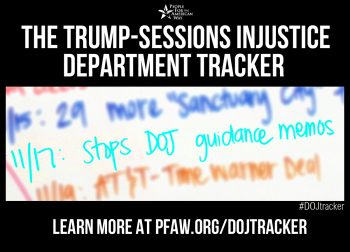 During a speech to the conservative Federalist Society, Jeff Sessions announced the end of using guidance documents to announce new regulatory requirements or significantly change interpretations of current law. This change was first hinted at in February when Sessions withdrew Obama-era guidance that required the equal treatment of trans people in school. (In October, Betsy DeVos and the Education Department also rescinded 72 guidance documents outlining rights for disabled students.) Such documents have often been used to clarify for the Department and the public how to interpret and enforce federal civil rights laws that ensure meaningful and equal participation for all.
During a speech to the conservative Federalist Society, Jeff Sessions announced the end of using guidance documents to announce new regulatory requirements or significantly change interpretations of current law. This change was first hinted at in February when Sessions withdrew Obama-era guidance that required the equal treatment of trans people in school. (In October, Betsy DeVos and the Education Department also rescinded 72 guidance documents outlining rights for disabled students.) Such documents have often been used to clarify for the Department and the public how to interpret and enforce federal civil rights laws that ensure meaningful and equal participation for all.
November 15: 29 more “sanctuary city” threats
On the same day that a federal judge barred DOJ from taking grant funds away from Philadelphia over its refusal to treat undocumented immigrants in police custody differently than other people in custody, DOJ issued threatening letters to 29 “safe cities,” or “sanctuary cities.” The Philadelphia ruling is the third time a federal judge has ruled against the administration’s efforts to block funds from going to such cities, but Jeff Sessions has continued to issue such threats.
November 14: Sessions won’t recuse himself from decision on investigating Clinton
Discussions around whether or not to probe the manufactured controversy around the Uranium One deal are heating up. The unfounded conspiracy theory that a U.S. government panel of nine agencies approved the sale of a large uranium firm to Russian interests in exchange for donations to the Clinton Foundation began to gain traction among right-wing figures during Trump’s presidential campaign against Hillary Clinton, and he continues to bring it up 10 months into his presidency. Jeff Sessions said DOJ was considering a special counsel for the case. There are a several problems to note:
- Sessions promised to recuse himself from investigations that have to do with the Clinton campaign. He should not be involved in the Uranium One investigation decision.
- There is also no evidence that there is anything to the Uranium One conspiracy. In 2015 and 2016, the FBI opened preliminary investigations into the idea that Clinton Foundation donations were tied to political favors and decided not to move forward due to lack of evidence.
- The timing of Sessions’ announcement seems to be directly linked to Trump’s comments in the media and online about DOJ and Sessions himself.
- Trump’s continued attacks on his political opponent in the 2016 election are undemocratic and a transparent attempt to distract from the investigations into his own campaign and his family’s potential crimes.
November 3: Jane Doe abortion case
Jane Doe, an undocumented teen in Texas, was originally blocked by Trump’s U.S. Department of Health and Human Services from leaving the facility where she was being held in order to get an abortion. After several delays, and only after an October 24 order from the U.S. Court of Appeals for the D.C. Circuit, was the teen cleared to have the procedure. But more than a week later, DOJ asked the Supreme Court to vacate the lower court order so it can’t be used as precedent by others in the future and to consider referring the girl’s ACLU lawyers for professional discipline, saying DOJ was misled about the timing of the procedure. The ACLU has called it a clear attempt by DOJ to clear the way for the federal government to block young immigrants in detention from receiving the legal procedure in the United States in the future.
November 2: Trump tirade on prosecuting Hillary
In what has been generously characterized as “a significant breach of the traditional boundaries” around DOJ, Trump said in a November 2 radio interview on that he was “very frustrated” that the DOJ is not “going after Hillary Clinton.” As president, Trump is not supposed to influence DOJ investigations. The next morning he tweeted “Let’s go FBI & Justice Dept.” about investigating Hillary Clinton. In the series of tweets, he also cited “deleted E-mails, Uranium, Podesta, the Server, plus, plus.”
October 19: Trump screens U.S. attorney prospects
“U.S. attorneys must be loyal to the Constitution — not the president,” said Sen. Dianne Feinstein the day she learned about Trump’s interviews with Geoffrey Berman for the job of U.S. attorney for the Southern District of New York and with Ed McNally for the Eastern District post. It is highly unusual for a president to get involved directly in screening prospective U.S. attorneys, especially when the potential nominees could later be in a position to investigate him.
October 8: “Quotas” for immigration judges
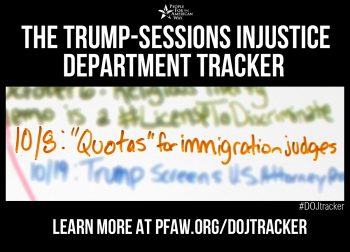
In a list of “immigration principles” released by the White House, the administration said it was imposing “performance metrics for immigration judges.” Additional documents obtained by The Washington Post show that the Justice Department intends to create quotas for judges deciding, as the Post put it, “life-or-death deportation cases.” This move would both threaten judicial independence and harm immigrants who face deportation.
October 6: Religious freedom memo is a #LicenseToDiscriminate
DOJ issued new guidelines on religious liberty for all federal agencies in a 25-page memo that appears to allow discrimination in the name of religion. It expands the interpretation of Religious Freedom Restoration Act (RFRA) in a way that could allow for discrimination against people based on things like sex, gender, faith, and race. In the creation of these guidelines, Sessions met with groups including Alliance Defending Freedom (ADF), which touted the guidelines for protecting anti-LGBTQ business practices. The memo could be used to justify the HHS expansion of the religious exemption to the birth control health care coverage mandate, to allow federal grant recipients to discriminate against LGBTQ people and others with taxpayer dollars, and to grant federal money directly to religious schools and other institutions that could use the money to pay for religious activities.
October 4: Takes first step to defend trans military ban in court
The Justice Department requested that a federal court dismiss a lawsuit challenging Trump’s move to stop accepting transgender people in the military. The lawsuit was filed on behalf of eight transgender individuals that are service members in the Air Force, Coast Guard and Army, and students in the Naval Academy and the ROTC program at the University of New Haven.
October 4: Sessions reverses policy that protects trans workers from discrimination
Buzzfeed reports: “The Justice Department under Obama decreed that Title VII of the Civil Rights Act of 1964 banned transgender discrimination in the workplace. But in a new memo, the attorney general rescinded the policy.”
September 29: Investigating fake “reverse racism” at Harvard
When it was widey reported that DOJ was planning “a new project to investigate and sue universities over affirmative action admissions policies they determine discriminate against white applicants,” a DOJ spokesperson denied the report. They claimed that DOJ’s Civil Rights Division was just looking for people “to investigate one administrative complaint” against one university in 2015. PFAW’s Elliot Mincberg reported early on that this probably wasn’t true. In a September 29 letter to BuzzFeed News and follow-up communications in response to a FOIA request, it became more clear that the DOJ is actively investigating Harvard’s admissions practices—a clear display of the Civil Rights Division’s priorities.
September 29: DISRUPTJ20, Facebook edition
On September 29, it was widely reported that the Justice Department had filed warrants to get extensive records of Facebook activities and information on three Facebook pages used by three people who participated in the “disruptj20” anti-Trump Inauguration Day protests. Obtaining this information would mean that the government would also know the identities of the thousands of people who’d “liked” the disruptj20 Facebook page. Overreaching warrants like this can have a chilling effect on First Amendment rights to organize.
September 15: Ends another police reform program (COPS)
DOJ announced that it is rolling back a program that was started by the Obama administration after Michael Brown was killed by a cop in Ferguson, MO. It is another move away from addressing excessive force and biased policing in our communities’ police departments. The collaborative reform initiative lived in the DOJ’s Office of Community Oriented Policing Services (COPS) and investigated systemic problems within police departments, monitored changes, and increased transparency issuing public reports on its findings. Federal reviews of local departments have been halted, so those agencies will no longer receive federal assistance from COPS for implementing reforms under the program.
September 11: DOJ doesn’t challenge Arpaio pardon
After Trump pardoned Joe Arpaio — the former Arizona sheriff known for putting Latinos in what he described as a “concentration camp,” for his ongoing “investigation” into racist birther claims, and for his contempt conviction in a racial profiling case — Justice Department urged a federal judge to drop the conviction entirely. Trump’s constitutionally dubious pardon of Arpaio (which even the judge seemed to question) threatens the rule of law and sends a signal to Trump friends who are under investigation or may be prosecuted that Trump will take care of them, and the DOJ will do nothing to stop this scandalous abuse of presidential power.
September 7: Supports Masterpiece Cakeshop’s right to discriminate
DOJ argues baker with religious objection to gay couple’s wedding has a free speech right to refuse them a wedding cake. PFAW submitted an amicus brief in the case.
August 28: Trump lifts ban on giving military equipment to local police
The executive order signed by Trump rolls back an Obama order that blocked armored vehicles, large-caliber weapons, ammunition and other heavy equipment from being re-purposed from foreign battlefields to American police departments. Sessions announced the plan in an address to the Fraternal Order of Police in the shadow of the Charlottesville unrest.
August 15: Won’t approve new medical marijuana research
After the Drug Enforcement Agency collected more than two dozen proposals on medical marijuana research, this work is now stalled until DOJ cooperates. As the Washington Post reported on August 15, “DEA officials said they need the Justice Department’s approval to move forward. So far, the department has not been willing to provide it.”
August 7: Switches side in OH court case to argue FOR voter purges
DOJ reversed course in a lawsuit challenging Ohio’s process for maintaining its voter rolls, aka “voter purging,” withdrawing its argument that Ohio cannot legally purge inactive voters—thus undermining its previous view of the National Voter Registration Act “Motor Voter” law.
August 7: Sessions slams Chicago over immigration policies
Sessions charged that Chicago officials are “obstructing federal immigration laws ‘to a degree perhaps unsurpassed by any other jurisdiction’ after the city sued the Trump administration over its threat to cut off federal grants to so-called sanctuary cities.”
August 4:
Sessions tells room of reporters he may make it easier to jail them if they don’t reveal sources, leaves without taking any press questions.
— Ari Melber (@AriMelber) August 4, 2017
Sessions announced that the Department of Justice was revisiting guidelines for handling media subpoenas in leak investigations and said there needed to be limits on press freedom. Read more from HuffPost.
August 4: Threatens to subpoena reports in leak investigations
The Department of Justice announced “that it was reviewing its policies on subpoenaing reporters in investigations of information leaks, a move that could compel journalists to break agreements to conceal a source’s identity or face legal consequences.”
August 3: FBI targets “black identity extremists”
 Over the summer, the FBI’s Counterterrorism Division, which is housed in DOJ, issued a report that created a new designation for domestic terrorists: “Black Identity Extremists,” or BIEs. It has been reported that the term did not exist before the Trump administration and it raises serious concerns considering the current administration’s links to white supremacists and the steps it has taken to criminalize communities of color and crack down on protests. Additionally, the U.S. government and FBI have a checkered past with extrajudicial targeting of civil rights leaders, including Martin Luther King Jr.
Over the summer, the FBI’s Counterterrorism Division, which is housed in DOJ, issued a report that created a new designation for domestic terrorists: “Black Identity Extremists,” or BIEs. It has been reported that the term did not exist before the Trump administration and it raises serious concerns considering the current administration’s links to white supremacists and the steps it has taken to criminalize communities of color and crack down on protests. Additionally, the U.S. government and FBI have a checkered past with extrajudicial targeting of civil rights leaders, including Martin Luther King Jr.
August 1: Attacks university diversity programs
News reports reveal that the Department of Justice is planning “a new project to investigate and sue universities over affirmative action admissions policies they determine discriminate against white applicants.” A DOJ spokesperson denied the report, claiming that DOJ’s Civil Rights Division (CRD) was just looking for people “to investigate one administrative complaint” against one university in 2015. But that’s just not true. A closer look at an internal DOJ memo on the subject reveals that the Trump-Sessions DOJ is starting a politically-run project trying to undermine programs that promote diversity on our nation’s college campuses.
July 28: Drops VA disability rights case
DOJ dropped its appeal to a disability rights case coming out of Virginia. In the case, a sheriff’s deputy named Emily Hall, physically incapable of resuming her old job after heart surgery, did not get a less strenuous job she was told to apply for. She sued, as did DOJ previously, and both appealed to the Fourth Circuit when their arguments were rejected by a lower court.
July 26: Argues against employment protection for workers based on sexual orientation
As explained by PFAW’s Elliot Mincberg, “DOJ went out of its way to file a friend-of-the court brief in a case it is not involved with to argue that federal law that prohibits sex discrimination in employment does not prohibit bias based on sexual orientation, in direct contradiction to the view of the Equal Employment Opportunity Commission, which has explained in that and other cases that federal law does provide such protection.”
July 25: Sessions announces plan to cut off sanctuary city funding
 Sessions announced plans to cut off significant federal funding to sanctuary cities–cities that have taken steps to protect immigrant families and communities–unless they agree to cooperate with aggressive federal immigration actions, including giving federal immigration agents access to local jails and holding immigrants for federal agents without a warrant. It is still unclear if pulling funding will be possible since a federal judge temporarily blocked the Trump administration from withholding funding over immigration policies.
Sessions announced plans to cut off significant federal funding to sanctuary cities–cities that have taken steps to protect immigrant families and communities–unless they agree to cooperate with aggressive federal immigration actions, including giving federal immigration agents access to local jails and holding immigrants for federal agents without a warrant. It is still unclear if pulling funding will be possible since a federal judge temporarily blocked the Trump administration from withholding funding over immigration policies.
July 21: DISRUPTJ20
The Department of Justice files a warrant that demands webhosting company DreamHost hand over all files and data related to the DisruptJ20’s website, which was used to post information about protesting Trump’s inauguration. DOJ is demanding personal information on every individual who ever visited the anti-Trump website.
July 19: Magee v. Coca-Cola: Sides with big business over people with disabilities
In its amicus brief in Magee v. Coca-Cola, DOJ argues that vending machines are not themselves places of public accommodation, thus assistance can be provided in lieu of making the machines accessible.
July 19: Sessions rolls back Obama civil forfeiture reform, i.e. police can take people’s stuff without pressing charges
Sessions receives bipartisan criticism for rolling back Obama-era civil forfeiture reforms, making it much easier for police to seize assets of anyone they suspect of a crime without even pressing charges against them.
June 30: Sessions supports anti-DACA lawsuit
Sessions supported 10 states that are threatening to bring a lawsuit if Trump doesn’t end DACA, a program allowing Dreamers to pursue careers and education without fear of deportation. Sessions said: “The DAPA law has already been withdrawn. That was a big victory, and we’ll be looking at that. But I’ve got to tell you, I like it that our states and localities are holding the federal government to account, expecting us to do what is our responsibility to the state and locals, and that’s to enforce the law.”
June 29: ERIC DREIBAND
Sessions backs Trump nominee Eric Dreiband to head the Civil Rights Division. Dreiband has spent much of his career defending large corporations accused of employment discrimination and has personally encouraged government policies limiting the rights and remedies available to discrimination victims. Additionally, Dreiband has no known experience working on most of the Civil Rights Division’s core responsibilities, such as voting rights, police reform, housing, education, and hate crimes.
June 28: Demands intrusive personal voter file info from 44 states
DOJ wrote to 44 states demanding information on what they have done to clean up their voting lists, suggesting that DOJ will “shift its resources towards scaremongering” over the nonexistent problem of widespread voter fraud, as Trump’s voter suppression commission has already begun to do.
June 16: Sessions Op-ed: Longer sentences for drug crimes
Sessions published an op-ed in the Washington Post arguing for longer sentences for individuals convicted of drug crimes, claiming that “being soft on sentencing means more violent crime.”
June 16: NLRB v. Murphy Oil: Sides with big business over workers
DOJ switched sides in an important Supreme Court case, NLRB v. Murphy Oil, now siding with big business against workers. The Justice Department formerly sided with workers fighting contracts that require them to forfeit their federally-protected right to bring a class action lawsuit against their employer if it violates the National Labor Relations Act. DOJ now supports big business claims that such contracts are perfectly legal.
June 15: STOPS POLICE REFORM CONSENT DECREES
News reports indicate that top officials in the DOJ civil rights division have issued verbal instructions throughout their ranks to seek settlements without “consent decrees.” Consent decrees, or court-enforceable agreements, are traditionally issued between DOJ and police departments to address improper and abusive police practices. Fourteen consent decrees with police departments are currently in place, with two dozen investigations started under President Obama. Without consent decrees, there would be no ongoing court oversight of these reform agreements.
May 23: DOJ budget proposal includes —
- allowing local police to detain immigrants for the fed
The Trump-Sessions DOJ budget proposes changes to substantive federal law that would require all local police to agree to detain immigrants in jail beyond their scheduled release date in order to be picked up by federal authorities. - a ban on policies that stop officials from asking about immigration status
The Trump-Sessions DOJ budget proposes changes to federal law that would prohibit cities and states from enacting any policy that would bar their officials from asking people about their immigration status. - blocking grants to sanctuary cities
The Trump-Sessions DOJ budget proposes changes to federal law that would allow suspension, or “claw back,” of grants from cities that do not comply with federal immigration laws. - cutting VAWA
The Trump-Sessions DOJ budget proposes that about $2 million be cut from funding to help implement the Violence Against Women Act. - cutting grants to support better policing
The Trump-Sessions DOJ budget proposes a 22 percent cut to the funding allotted for DOJ’s largest grant program that supports effective state and local law enforcement.
Missing from budget proposal —
- voter discrimination
On voting rights, the Trump-Sessions DOJ budget proposal conspicuously omits a commitment to “focus on detecting and challenging practices that violate Section 2 of the Voting Rights Act,” which bans election-related changes that have a discriminatory effect on voters. - disability rights
The Trump-Sessions DOJ budget omits mention of disability rights enforcement; the previous Obama-Lynch budget had made it a priority.
May 10: Max. penalty for drug crimes
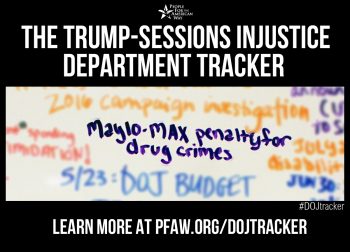 Sessions directed federal prosecutors to seek the maximum penalty possible in every case, including cases of drug possession. The highly-criticized directive reversed Obama-era drug policies on charging and prosecuting drug offenders.
Sessions directed federal prosecutors to seek the maximum penalty possible in every case, including cases of drug possession. The highly-criticized directive reversed Obama-era drug policies on charging and prosecuting drug offenders.
May 9: Sessions violates recusal oath, re:2016 campaign investigations
Trump’s firing of FBI Director James Comey raises grave concerns about preserving the rule of law in our nation. Among the many deeply disturbing aspects of this action is that the attorney general played an active role in the decision. Sessions’s role was in blatant violation of his recusal from any investigations of the Trump campaign, including any potential collusion with the Russia government’s interference in the 2016 presidential election. The people deserve an impartial, balanced investigation into Russian influence in the election and any collusion by the Trump campaign. As the country’s chief law enforcement officer, Sessions plays a central role in this country’s rule of law, and his clear conflict of interest threatens the center of our elections and our democracy.
May 2: Challenges health care protections for trans* and pregnant people
DOJ filed a motion in a case challenging the Affordable Care Act’s anti-discrimination protections for the transgender community and pregnant people. The motion pauses current litigation and sends the implementation regulations back for review by the Department of Health and Human Services. Months earlier, DOJ had let stand a court order against the regulations.
May 1: Sessions tries to end protection for people using medical marijuana
Sessions personally wrote to Congress to seek an end to a bipartisan measure that prevents DOJ from prosecuting people for using medical marijuana that is legal under state law.
April 30: 100 days: Still silent on hate crimes
Other than the a new hate crimes subcommittee, created after pressure from 13 senators, there has been a “deafening silence” from Sessions on hate crimes.
April 24: Sessions supports “broken windows” policing (not the last time)
Sessions voiced support for “broken windows” policing — the failed approach of strengthening enforcement against petty crime to prevent more serious crime. This type of policing has led to the targeting of communities of color and damaged relationships between law enforcement and the communities they serve.
April 21: Sessions threatens funding of 9 sanctuary cities.. AGAIN
Sessions sent a letters to nine “sanctuary cities,” or districts, that have taken steps to protect immigrants from federal prosecution and deportation, threatening to pull federal funding from cities that did not abide by the federal immigration mandates by June 30. Jurisdictions targeted include New York City, Chicago, New Orleans, Philadelphia, Las Vegas, Miami, Milwaukee, and the state of California.
April 19: Sessions defends Trump’s 1st Muslim ban, insults Hawaii & judges
During a radio interview, Sessions defended Trump‘s unlawful Muslim ban. He played down the authority of a Hawaii-based federal judge who had blocked the first of Trump’s Muslim ban executive orders, saying he was “amazed that a judge sitting on an island in the Pacific can issue an order that stops the President of the United States from what appears to be clearly his statutory and Constitutional power.” Sessions later stood by his remarks.
April 14: Drops lawsuit against NC bathroom ban
DOJ dropped a lawsuit against the infamous North Carolina “bathroom ban” that harms transgender people. This was after HB2 was partially repealed in a so-called “compromise” that did not go far enough to protect the rights of trans students.
Apr 11: Sessions calls for more, tougher prosecution of undocumented immigrants
Sessions directed U.S. Attorneys to expand prosecutions of undocumented immigrants and look to bring serious felony charges against those who cross the border illegally.
Including for non-violent offenses
Sessions directed all federal prosecutors’ offices, even those far from any border, to devote significant new effort and resources to prosecuting any and all immigration-related offenses–including non-violent offenses—reversing prior DOJ policies.
April 10: Ends forensic science partnership (ANTI-SCIENCE!)
Sessions announced the end of a “Justice Department partnership with independent scientists to raise forensic science standards and has suspended an expanded review of FBI testimony across several techniques that have come under question.”
April 7: Tries to delay police reform in Baltimore
 Sessions tried to delay judicial approval of an Obama-era agreement between DOJ and Baltimore with a comprehensive plan for the city to reform its police practices. This was despite the city’s own objections to the delay and support for the consent decree. The federal judge ultimately rejected the delay and on April 7 approved the decree.
Sessions tried to delay judicial approval of an Obama-era agreement between DOJ and Baltimore with a comprehensive plan for the city to reform its police practices. This was despite the city’s own objections to the delay and support for the consent decree. The federal judge ultimately rejected the delay and on April 7 approved the decree.
March 31: Starts process of scaling back police reform agreements
Sessions ordered a review of more than a dozen “consent decrees,” or court-enforced federal agreements with local police forces that address problems of racial profiling, discrimination and use of excessive force, and mandate an end to abusive practices.
March 31: Backs arresting undocumented immigrants at courthouses (INTIMIDATION!)
Sessions signed on to a letter with Homeland Security Secretary John F. Kelly backing the practice of arresting undocumented immigrants at courthouses. The intimidation tactic only further alienates immigrants from the justice system and further criminalizes immigrants who have not committed violent crimes.
March 16: Proposes $80M increase in “immigration enforcement” spending
Despite significant cuts elsewhere, the DOJ budget that Trump announced on March 16 proposed spending $80 million, an increase of 19 percent, to hire 75 more immigration judges, and would add 120 border prosecutors and other legal officials to focus even more on DOJ’s overly aggressive goals for immigration enforcement.
March 8: Brings back failed War on Drugs
Sessions issued a memo declaring that “disrupting and dismantling…drug organizations through prosecutions under the Controlled Substances Act can drive violent crime down,” signifying a turn back to prosecuting drug offenders in a flawed effort to target violent criminals. The move threatens to return us to failed “War on Drug” policies that turned America into the largest jailer in the world while failing to reduce violent crime.
March 1 or 2: Stop Sessions’ recusal
Reported first by The New York Times in early January 2018:
“President Trump gave firm instructions in March to the White House’s top lawyer: stop the attorney general, Jeff Sessions, from recusing himself in the Justice Department’s investigation into whether Mr. Trump’s associates had helped a Russian campaign to disrupt the 2016 election.”
Despite Sessions’ clear conflict of interest in the investigation—Sessions had met during the presidential campaign with Russia’s ambassador to the United States and lied about the meetings to Congress— White House Counsel Donald McGahn carried out the Trump directive. But Sessions had already decided to recuse himself from the investigation in late February.
February 27: Rolls back criminal justice reform
Sessions announced the Department of Justice “Task Force on Crime Reduction and Public Safety,” one of the administration’s first concrete steps toward reversing bipartisan criminal justice reform policy, as well as a continuation of its ongoing fearmongering around illegal immigration, drug trafficking, and violent crime. Trump had signed an executive order calling for the task force on February 9, before Sessions’ swearing-in ceremony.
February 27: Sides against voters in TX voter ID case
DOJ reversed course in a lawsuit challenging the Texas voter ID law, withdrawing its argument that the law was intended to discriminate. A judicial finding of intentional discrimination would elevate it from a violation of the Voting Rights Act to a constitutional violation. That would enable the court to effectively undo the strict voter ID law and even potentially restore federal preclearance for voting changes in Texas.
February 21: Restores use of private prisons
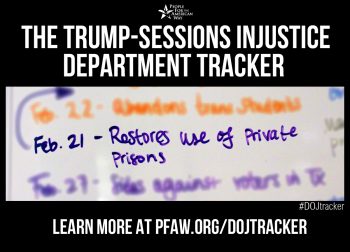 Sessions reversed a prior DOJ policy and announced that DOJ will use privately run prisons, despite clear evidence of serious safety and related problems for both prison officials and prisoners.
Sessions reversed a prior DOJ policy and announced that DOJ will use privately run prisons, despite clear evidence of serious safety and related problems for both prison officials and prisoners.
February 22: Abandons trans students
One of Sessions’ first acts as attorney general was to abandon transgender students by undermining anti-discrimination protections granted by the previous administration. First in court in early February, followed two weeks later by the withdrawal February 22 of an official guidance document that had been jointly issued with the Department of Education. This withdrawal eventually led the Supreme Court to vacate a lower court opinion protecting Gavin Grimm’s right to use the boys’ restroom at his Virginia high school. The lower court’s opinion had been premised on the DOJ-Education guidance.
January 25: Trump revokes sanctuary city funding (EO)
Trump issued an executive order saying municipalities that won’t cooperate with federal immigration laws, or “sanctuary cities,” will not qualify for federal grants. The federal grants that might be vulnerable include $9 million from the Department of Justice and $156 million from the Department of Homeland Security.